
Adversity is a given.
Former South African rugby captain Jean de Villiers knows that as well as anyone.
During his playing career he had six knee operations, shoulder reconstruction, a bicep rupture, he broke his jaw twice.
It was not just the injuries, they came at big moments.
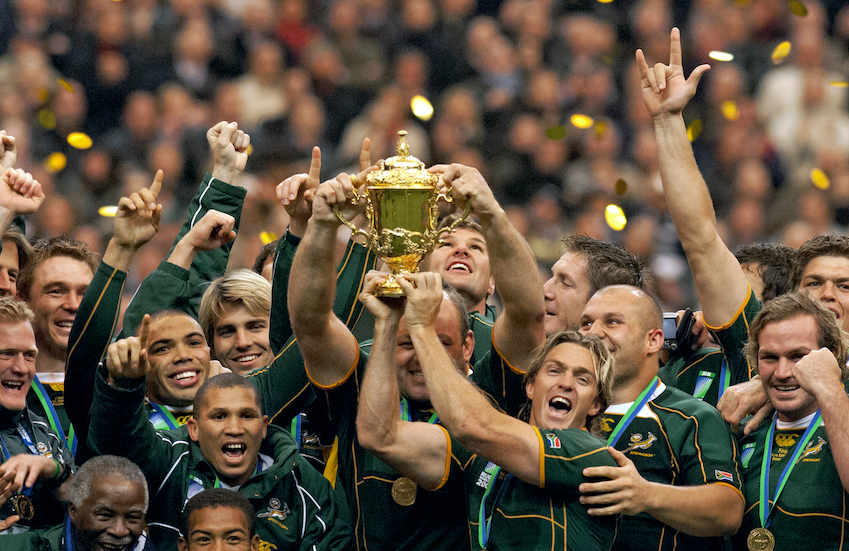
Pictured: South Africa lift the Webb Ellis Cup in 2007.
He won the World Cup with South Africa in 2007, but that bicep tear happened in the opening game of the tournament, ruling him out of the other matches.
He was captain as the competition took place in England in 2015, but fractured his jaw in the second game against Samoa and was ruled out of that tournament, not before being on the wrong side of the “greatest upset in rugby history” against Japan.
His first major injury came on his debut in November 2002 against France.
“It was a lot,” said de Villiers.
“But I would not be sitting here if it wasn’t for those injuries. I honestly feel that up until the stage where I made my debut for South Africa at the age of 21 I had it pretty easy. Yes, I worked hard, maybe I was lucky in terms of selections, but it came quickly.
“Playing in your first test match, working towards it, and then ending up getting stretchered off, suddenly it puts everything into perspective and you start realising that what you love can be taken away so quickly."
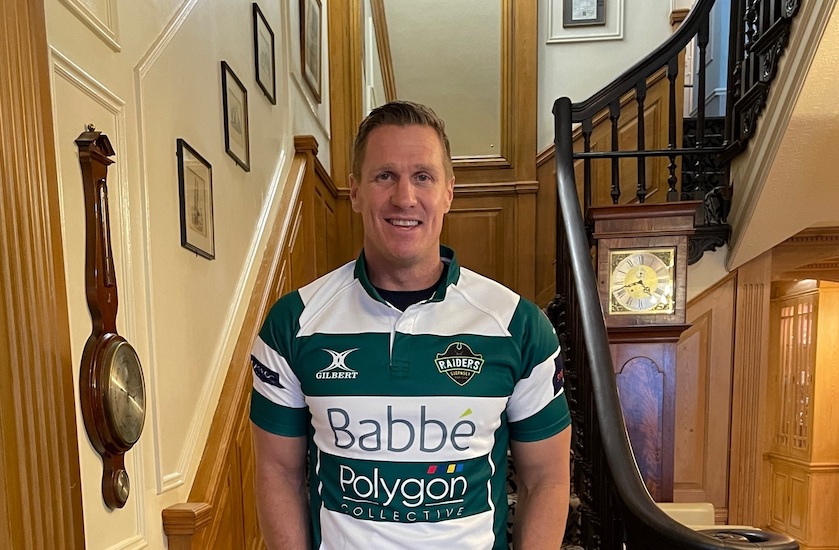
Pictured: Jean de Villiers has stayed connected with rugby since retiring as a professional, including by taking trips to Guernsey Raiders.
“You learn how to deal with disappointment, you learn that you need to surround yourself with good people to be able to rely on them when you're not able to move on and keep going.
“You appreciate it so much more when you get the opportunity again.”
De Villiers is applying lessons from the sporting world as he moves on with his life after rugby.
“Adversity is a given for anyone and everyone but it really is your attitude in times of adversity that will determine whether you are successful or not eventually, and what you deem success to look like.
“So I learnt that through the injuries, some of the losses that we went through as well. It's tough, how do you get through that? But the learnings through the injuries have certainly in my case made me a better person, you learn through it and then you can apply it in life as well.”
Not everyone makes the step out of professional sport with the ease that de Villiers has.
Former players can struggle with depression and anxiety as support networks are suddenly ripped away.
“Everything that I ever worked towards was to become a rugby player, then you do whatever you can to be a good one and to maintain that level,” said de Villiers.
“You get a decent salary. You probably have sponsored clothing, a sponsored car. When you walk into a room, people recognise you, people want to talk to you, you might go into a restaurant and then you get the meal for free.
“Your week is planned out by your team and by your trainers. You're travelling a lot, so you’re basically at home only six months of the year.
“Then you retire and everything changes. Your income goes to zero, immediately. All the other add-ons and luxuries slowly but surely go away as well. You’re home all the time, so your wife and kids need to get used to you being there, and it might sound strange, but you need to adapt to that because they are in their structure and you are actually making a mess of it now. I suppose the most important thing is that you have to reinvent yourself and find the same purpose and meaning in a job that is totally different to what you've been doing.”
He said he was lucky to move into a role with SuperSport, a South African sports broadcaster.
It meant he stayed connected with rugby.
He also found a role as Head of Philanthropy with Citadel, a wealth management company that operates in Guernsey as Peregrine Wealth.
“I came with a different skill set. But the big question was how do you apply that skill set to really add value to the organisation? Luckily, over time I was able to get that right. I'm definitely one of the lucky few that could move into something and transition quite quickly.
“Other guys struggle massively with their transition, because you need to reinvent yourself. I think the best way to describe it is probably like someone going through retirement. You're in a corporate job for 50 years, 40 years maybe and then at the age of 65 or 70, you retire and you move into something new - but we do that at the age of 35. You still have many years to live after that, so the financial pressures starts weighing heavily. I got through it. And seven years later, I'm pretty uncomfortable now where I'm at.”
Growing up, de Villiers always wanted to play rugby.
His dad played for Western Province in the days when the game was still amateur.
When he should have been revising for exams, his mum could hear a rugby ball being thrown against the bedroom wall. She would walk in and he might be spinning it on a hand.
He always thought a career in rugby would be an option, even though the game only turned professional a couple of years before he left school.
But by the time his school days were drawing to a close, he already had his first contract.
There were plenty of highs along the way, including Tri Nations Championships, big team performances creating memories on and off the pitch.
Everything all came together for his 101st test.
His century was played in a defeat against New Zealand in Wellington.
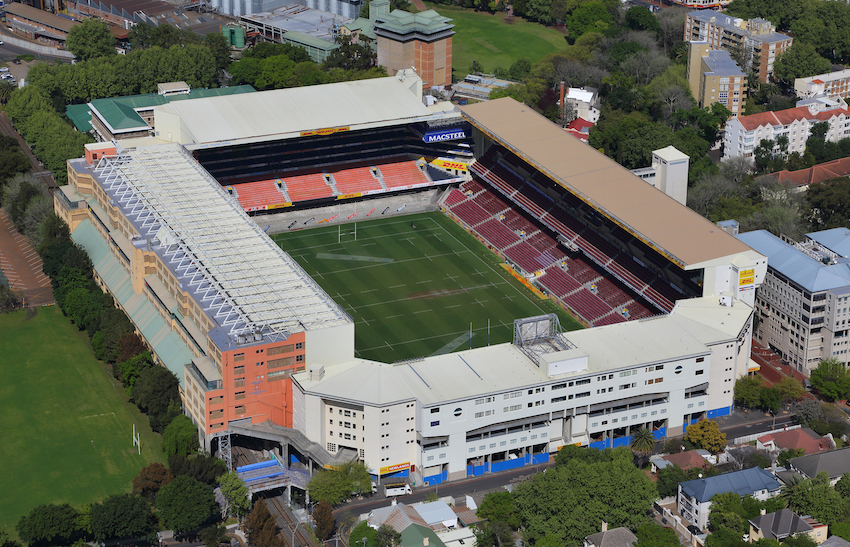
Pictured: The iconic Newlands stadium in Cape Town.
The next match was at Newlands in Cape Town - a stadium where he learned to love rugby.
It was where he saw his first live game and his first test in the days where you could run onto the pitch afterwards and throw a ball around imagining you were representing South Africa.
It was also where he played all his age-group level rugby and all his professional club rugby with Western Province and the Stormers.
They played Australia.
“I was captain at the time,” said de Villiers.
“I was able to run out with my two daughters by my side. My wife, who was pregnant with our son at that stage, was at the game, my parents. My brother was at the game, loads of friends. We won and I scored two tries. I can remember after the game, I took the two girls and they were running around on the pitch and I was like, ‘well, this is basically everything that I love thrown into one day’. I just thought I should retire now, I probably should have, but it was an amazing day.”
The role of rugby in South Africa is huge. It is more than a game. More than a result.
“Other teams play to win, to score more points than the opposition. I think for us, it's way more than that, because when you win you provide so much more for your country.”
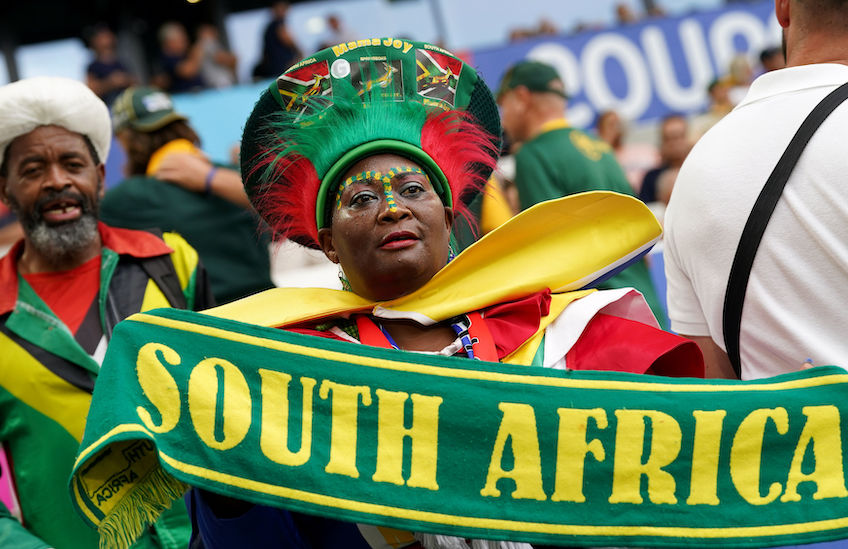
Pictured: A South African fan at the 2023 Rugby World Cup. (Adam Davy/PA Wire)
Major moments in the country’s history coincided with success on the rugby field.
Rugby provided a platform where people could celebrate together, de Villiers said.
“In 1995, we won the World Cup, we hosted it in South Africa. And suddenly you had something that didn't pull people apart, but actually brought people together and they were happy together, they realised that even though we were very different in terms of certain things, at the end of the day, we were all South African, and if we find a common purpose that brings us together, then there's no reason why we can't function together.”
The side now is far more representative of the whole country than it was in 1995.
“That to me is a beautiful thing. Rugby really is the ultimate sport where you are putting your body on the line for your teammates and for your country. It is like going to war. But you can put 15 different people together with totally different backgrounds and they work towards the same common goal.”
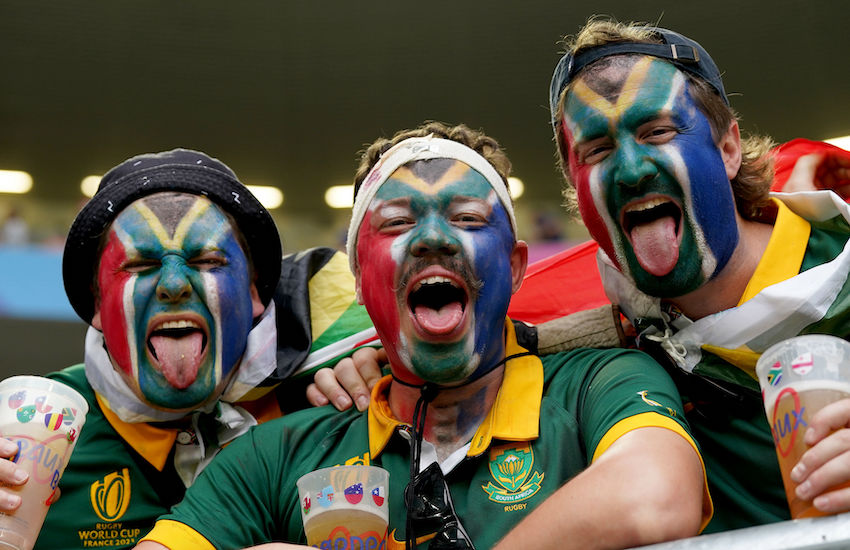
There is an added responsibility playing for South Africa, something that drives the players.
“If you lose, you take joy away from a lot of people in South Africa and we rather want to be the people that can provide the joy.”
The Springboks are among the favourites to lift the Webb Ellis Cup this year in France, having won the tournament four years ago in Japan, beating England in the final.
They have begun their campaign strongly with an 18-3 win against Scotland on the opening weekend and a 76-0 stroll past Romania on Sunday.
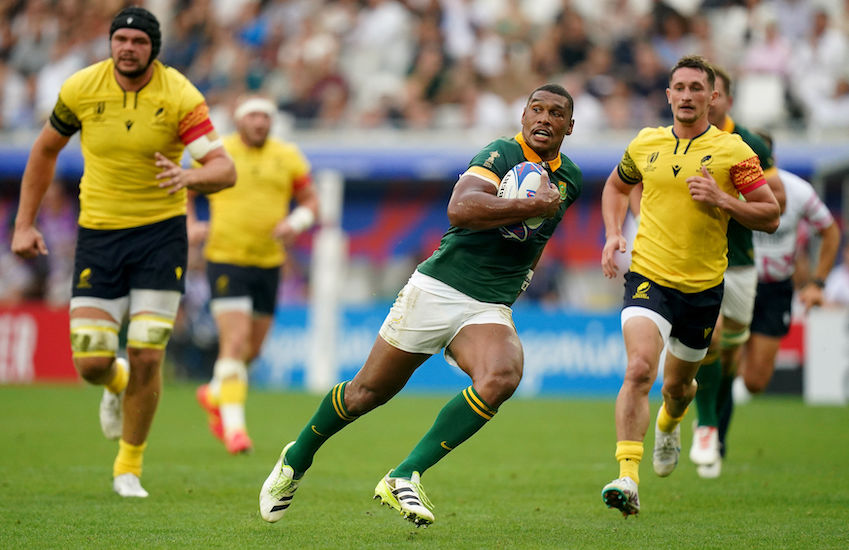
Pictured: Centre Damian Willemse against Romania. (Adam Davy/PA Wire)
They face a tough game against Ireland on Saturday in a tie that should decide who progresses as group winners.
Injury problems are a concern, though.
Talismanic lock Eben Etzebeth withdrew after 26 minutes with a shoulder injury against Scotland, but has responded well and is now in contention to face Ireland.
Hooker Malcolm Marx has been ruled out of the rest of the tournament with an ACL injury.
“We’re definitely good enough to win this World Cup. But the problem is, we've probably got another three teams that are good enough to win at it as well. On the day, you can need a little bit of luck and you're going to need no serious injuries to key players. Only time will tell, but it was a good start.”
Comments
Comments on this story express the views of the commentator only, not Bailiwick Publishing. We are unable to guarantee the accuracy of any of those comments.